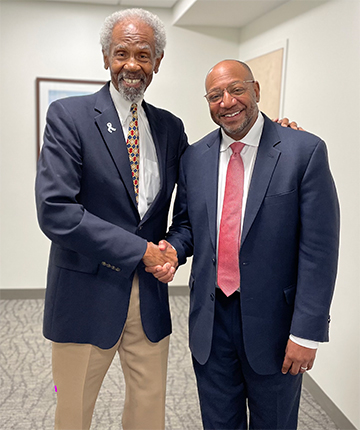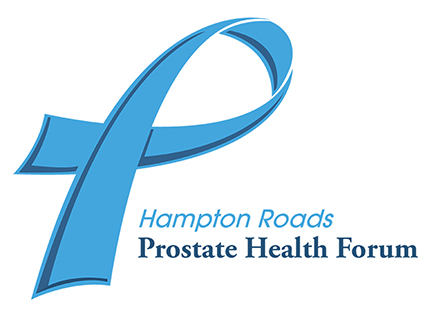My Favorite Charity Spring 2024The Hampton Roads Prostate Health Forum
Mark T. Fleming, MD, Virginia Oncology Associates; and Charlie Hill, Co-Founder and Cancer Survivor

Back in 2006, prostate cancer survivor Charlie Hill was at an appointment with Mark Fleming, MD, a national expert on the disease, when their conversation turned to the lack of educational and screening resources for local patients.
That meeting would fuel the 2007 launch of the Hampton Roads Prostate Health Forum (HRPHF), a nonprofit shaped by Hill’s long journey with cancer.
Since then, the grassroots organization has been a powerful voice for awareness, prevention and prompt detection of prostate cancer, which is relatively treatable when caught in its early stages. Hampton Roads has some of the highest incidence of the disease in the state.
“I told myself that should I survive this, I would do something for other men and the women in their lives,” recalls Hill, a Newport News native and current Hampton resident who turns 80 in late April. “People need good information and support to be able to ask the right questions and find the best care.”
Hill and Dr. Fleming, a Virginia Oncology Associates specialist who lost his father to prostate cancer, founded HRPHF with Richard Rento, MD, a urologist, and Golden Bethune, a nurse and hospital executive who is Hill’s wife. The four assembled a Board of Directors with medical experts and representatives from regional healthcare organizations and large businesses.
Today, HRPHF organizes about six free prostate cancer screenings a year, often at churches during June’s Men’s Health Month and September’s Prostate Cancer Awareness Month. Each event offers both prostate-specific antigen (PSA) blood tests and digital rectal exams (DRE), along with a variety of take-home informational materials.
Nurse practitioners and other volunteer providers also encourage men to research their family history, understand their risk factors and talk to their physician about the benefits and downsides of PSA, DRE and other tests such as prostate volume and urinary output.
“The inclusion of educational programs, PSA testing and optional DRE really sets us apart,” Dr. Fleming notes. “We’ve also earned a lot of trust in the community over time.”
HRPHF is working to build an extensive online library with statistics and modules on topics such as risk factors, up-to-date screening guidelines, symptoms, diagnostics, management of side effects and a growing list of treatments that include targeted radiation, immunotherapy, PARP inhibitors and hormone therapy (or active surveillance if indicated).
HRPHF’s goal is to educate as many men as possible by age 35 – as well as their wives, mothers, sisters, daughters and other women in their lives – so they can follow screening recommendations that might begin at 40 or 45 and navigate potential concerns such as incontinence or impotence that can impact relationships.
“If we can spread awareness, more people will not have to endure what I did as a son – or what I see too often as an oncologist,” shares Dr. Fleming, a past HRPHF President and current Board member.
“We’re currently searching for even better ways to present and update our online information to be very patient-friendly,” adds Hill, the HRPHF’s only full-time staff member. “We want to help patients and families avoid unnecessary suffering, as well as bring together newly diagnosed patients and longer-term survivors to lean on one another.”
Hill was diagnosed with prostate cancer in June 2002, only two weeks after his first wife lost a 17-month battle with lung cancer. At first, he didn’t believe it. Then, he had no idea what to do about it.
After several months of research and, at times, conflicting medical advice, Hill underwent nerve-sparing surgery to remove his prostate gland. When his cancer returned two years later, he completed more than 30 rounds of radiation. He also was diagnosed with lymphoma in 2011.
While his cancer has never fully disappeared, Hill is doing well with annual PSA monitoring. He also credits a healthy diet and exercise plan, and a strong relationship with Dr. Fleming, his oncologist.
“I have nothing but joy in my thoughts,” Hill relates. “I’m still standing, and I’m delighted to be an example for men who are in that spot wondering, ‘What’s going to happen to me?’”
Reaching higher-risk and underserved populations is another focus. Dr. Fleming and Hill recently participated in a comprehensive literature search and review to generate proposed PSA screening guidelines for Black men. That population is at higher risk of being diagnosed with prostate cancer, of presenting with a more aggressive form of the disease, and of dying.
A panel of national experts drawn from different medical specialties produced a poster for the American Society of Clinical Oncology on behalf of the Prostate Cancer Foundation (PCF), a national group that funds research into the prevention and cure of the disease.
Based on the evidence to date, the researchers advise all Black men to begin discussions about screenings with their provider by age 40 and to do a baseline PSA before 45 (current guidelines for all men suggest an initial test by age 50 for those at average risk, and between 40 and 45 for higher-risk patients). The panel also urged further study of the issue.
The study has been accepted for publication in the New England Journal of Medicine’s “Evidence,” a monthly digital journal; the PCF has already adopted its recommendations.
“This is the first time that guidelines have ever been developed specifically for Black men,” says Dr. Fleming, an author of the study. “Now, our job is to get that message to people throughout Hampton Roads.”
Depending on PSA results and health background, most Black men should undergo annual PSA testing up to age 70 and then consult with a provider on future steps. He continues: “We’re really emphasizing communication between patients and doctors on an individual level.”

Moving into the future, HRPHF hopes to hire a full-time Patient Navigator to extend outreach activities and provide educational handouts and slides to churches and other willing community organizations, which could then distribute them or plan their own presentations.
“Think about the multiplier effect,” Hill says. “We could have events across Hampton Roads on the same day and reach far more people. Ultimately, we’re looking to paint a much better picture of this disease in our region.”
For more information, visit hrprostatehealth.com or call (757) 827-0488.

